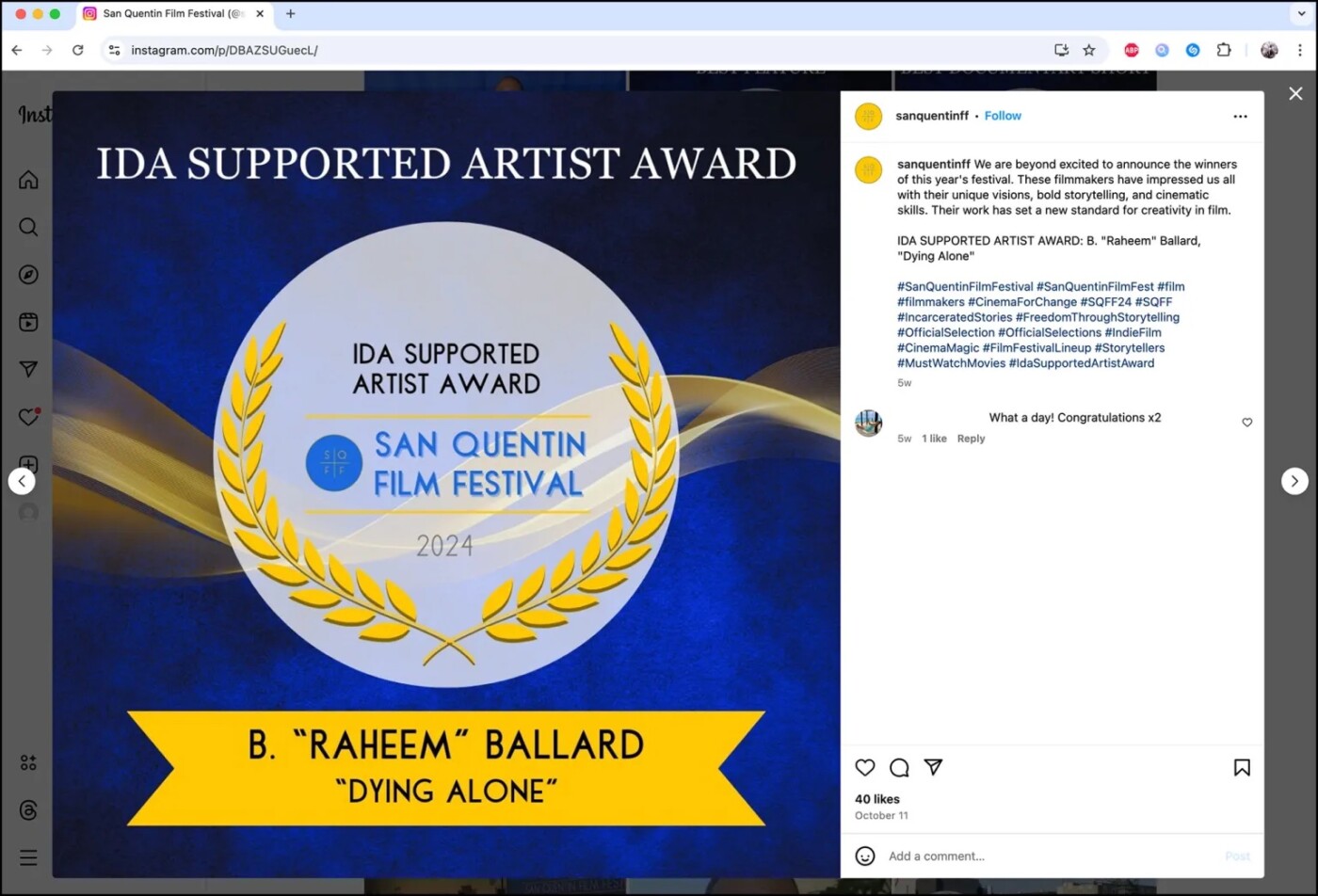AS BERNARD “RAHEEM” BALLARD stood behind the podium inside of the San Quentin Rehabilitation Center’s chapel, the incarcerated man was greeted by a loud standing ovation.
He was attending the first-ever film festival inside of a prison. The crowd had just learned that he was found suitable for parole after serving 22 years.
On the same day, Ballard won the Supported Artist Award from the International Documentary Association, and the American Documentary POV award, for his film “Dying Alone.”
“It doesn’t feel real. It feels like a dream. I couldn’t even smile when I took a picture with Kerry Washington,” he said, referring to an earlier meeting with the famous actress. “I am still in shock.”
Ballard wasn’t supposed to be eligible for parole until the year 2039. He said the thought of that made it hard for him not to give up. In 2002, Ballard was battling an alcohol and drug addiction. It was made worse by the untimely death of his father. He strayed from his Islamic religion and spiraled into living a criminal lifestyle.
“I was irresponsible,” he said. “I was operating with a gang mentality. I was self-centered and I was capable of violence. I didn’t care about myself or others. Using drugs and alcohol was how I was able to cope with my life.”
Ballard ended up murdering a man during a robbery over money and drugs. He was sentenced to 35 years to life in prison. He thought the only way he was going to leave prison was in a pine box.
“I really don’t deserve any applause for what I’ve done. I have to think about the victim of my crime. I can’t let that dreadful morning of Sept. 18, 2002, be forgotten. I never have a good week around this time of year.”
‘Everything went downhill’
Born in Buffalo, New York, in the 1970s, Ballard grew up snowboarding downhill in winter snow on plastic garbage can lids. In the summer, he played baseball and dreamed of growing up to be a Major League Baseball player.
“I tried to build a construction business,” he said. “But it failed. I ended up working at a fitness gym. But everything went downhill.”
While sitting in prison, Ballard learned about the pain he caused others. He started taking self-help groups like one that teaches people to understand the magnitude of a crime from the victim’s perspective.
He said he started to feel ashamed of his behavior and strived to educate himself. Ballard started attending Narcotics Anonymous meetings and studying his religion. He also took college courses. He got his associate degree from Lassen Community College.
Today, he credits Islam, long distance running and filmmaking for helping him regain his focus.

“Two years ago, I got an opportunity to join SQTV in the San Quentin media center,” he said. “I started working on multiple projects, including a tribute to Frank Rouna, a retirement film about the coach of the 1,000 Mile Running Club,” a long-distance running group that runs a marathon once a year at San Quentin.
“That’s how I got to this project called ‘Dying Alone,’” Ballard said.
The documentary “Dying Alone” focuses on three elderly men serving life sentences who are seeking a compassionate release due to terminal illnesses. The documentary is short but it’s also thought-provoking and full of gut-wrenching emotions.
Ballard said his main motivation for doing this film was the prospect of dying alone in prison. But as the film developed, he began to connect personally with those around him.
“This film was about restoring humanity for me,” he said. “I developed empathy for people and started caring about the people in my community. Prior to this, all I cared about was myself. Now I was acknowledging the hurt and pain of others.”
The meaning of teamwork
Ballard sat behind his computer in the media center, editing the film for hours, days, weeks and months. When he wasn’t in the media center, he jogged along the lower yard track preparing for long distance running events. He appears in the film “26.2 to Life” about the San Quentin prison marathon as a member of the 1,000 Mile Running Club.
“For me this documentary showed how important hard work and teamwork is,” he said. “I couldn’t have done this by myself. I have to thank all my coworkers at SQTV, the San Francisco Film Society and Christine Yoo who directed and produced the San Quentin marathon documentary.”
PBS is now considering showing “Dying Alone,” according to Ballard.
Faced with that prospect, Ballard wants to continue developing his craft by networking with filmmakers on the outside. He said he wants to do films about incarceration and social justice issues. He wants to show the world that rehabilitation is possible and that people can choose not to walk in the ugliness of their destructive behavior.
Besides filmmaking, Ballard said he wants to do the simple things in life, like walk along the beach, feeding birds and going fishing. He also likes to write poetry and do acrylic art.
He said he’s thinking about taking a film class at San Francisco State University through Project Rebound, a California State University program that supports the higher education and reintegration of formerly incarcerated people.
“I don’t want the horrible crime that I committed to be the last words written about me,” he said.
Steve Brooks is a California Local News Fellow with Bay City News Foundation, reporting from inside San Quentin Rehabilitation Center. His perspective gives readers insight into issues and news from inside the prison. See more of his work at Inside/Out on Local News Matters.
The post Incarcerated filmmaker wins parole same day his documentary wins San Quentin exhibition appeared first on Local News Matters.
